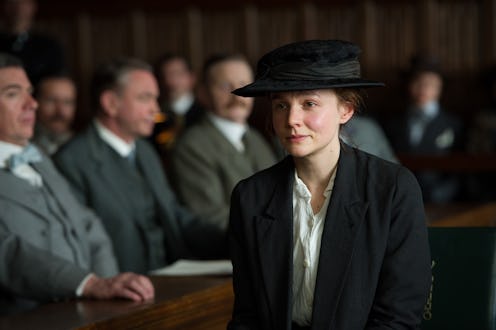Entertainment
Abi Morgan On 'Suffragette's T-Shirt Controversy

On Monday night, Suffragette screenwriter Abi Morgan appeared at the Standard, High Line in New York for a BAFTA-hosted question-and-answer session, during which she spoke about her screenwriting process, power dynamics on screen, and her background writing for theater and television. Before her talk, Morgan spoke to Bustle about her response to the now-infamous t-shirt backlash to Suffragette and incorporating marginalized voices into narratives.
"It was really important we have that conversation. I think it was right for people to talk about it," Morgan says of the response to Time Out's promotional shoot, though she added that "it’d be a pity if it distracted from the central narrative of the film, which is about equality for all women." In spite of this "central narrative," Morgan says she's supportive of the ways Suffragette and its surrounding promotional efforts have been used to advance the discourse around diversity on screen.
There was not one, but many, suffragette movements in the late 19th and throughout the 20th centuries. The Cary Mulligan film Suffragette depicts just one — the British movement that began peacefully in the late 1800s but then turned to civil disobedience when more pacifistic measures yielded no results. The film opens on the Night of the Broken Panes, a large-scale protest in London, during which suffragettes tossed bricks into shop windows, crying, "Votes for women!"
It's the first encounter the protagonist Maud Watts has with the movement, and while it piques her interest, she becomes more swept up in the momentum of activism than she is a willing participant. The core cast of Suffragette — Mulligan, Meryl Streep, Anne-Marie Duff, and Romola Garai — similarly found themselves at the center of a swirl of controversy with a recent, and now infamous, Time Out London cover on which the actresses wore t-shirts bearing the slogan, "I'd rather be a rebel than a slave."
The quote is actually the kicker of a speech by Emmeline Pankhurst, the empowered leader of the British suffragette movement. Pankhurst, played by Streep, delivers the speech midway through Suffragette; it's a galvanizing moment, intended to rally the women to action with similar slogans like "Deeds, not words."
But removed from context, the Suffragette t-shirt quote brings up connotations of the American confederacy, and of the undeniable racism of the American suffragette movement from which women of color were all too often marginalized.
"Our film focuses on the U.K. movement," Morgan says. "The American movement was much more diverse, and women of color were excluded. It’s a fact." When suffrage was ratified by the 19th Amendment in 1920, women of color, primarily in the south, still found it nearly impossible to register, confronting local bureaucracies adamant about constraining their access to the political process. In that context, the quote appears less like a rallying cry and more a testament to the liberty of white women to choose rebellion over slavery, a liberty that was not then an option for many women of color. And critics on Twitter picked up on this dissonance, decrying Time Out's choice of quote for a promotional photo shoot.
While Morgan says she sought out ways to include voices of color in her narrative, "it just didn’t quite work." She cites Sophia Duleep Singh, a British-Indian aristocrat who was involved in the Black Friday protests after working-class women's deputations before Parliament failed to incite change, as an example of a persona she attempted to include. But Suffragette focuses on the working class, so Singh's world would not have intersected with the wash house environment Maud Watts inhabits, according to Morgan. And though there's been one main image circulating of a group of Indian women protesting around the time of the events portrayed in Suffragette, Morgan says they were actually marching for Indian independence, rather than voting rights.
Despite historical accuracy, studies have shown that it's critical that women are able to identify with characters on screen. Research by the Geena Davis Institute shows that representations of women on television and in film do not accurately reflect the number of women entering STEM industries in particular — rather, they're underrepresented on screen. The study also noted that women are outnumbered in the "C-suite" as represented on prime time television, with characters playing executives skewed 86 percent male to 14 percent female. During Monday night's talk, Morgan explained that there's further evidence that women are more likely to want to enter fields in which they might picture themselves represented on screen.
A logical extension of this would be including actresses of varied backgrounds, races, and ethnicities, so that when we look around that wash house or that executive office, white faces aren't the only ones we see.
Editor's Note: a prior version of this story erroneously referred to the hotel as The Standard Hotel, not The Standard, High Line.
Images: Lionsgate (2)